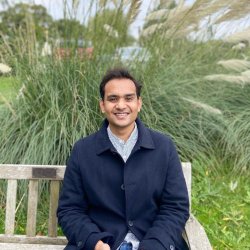
Dr Shashi Kant Yadav
Academic and research departments
Surrey Centre for International and Environmental Law, Surrey Law School, Faculty of Arts, Business and Social Sciences.About
My research project
Regulating fracking as transitional technology in India and Australia: a comparative contextual approach to the precautionary principleMy research broadly focuses on how law addresses the limitations of science in predicting the impact of energy transitional technologies on climate change mitigation measures.
Supervisors
My research broadly focuses on how law addresses the limitations of science in predicting the impact of energy transitional technologies on climate change mitigation measures.
My qualifications
Affiliations and memberships
News
In the media
Teaching
Land Law - I
Publications
Indian authorities have formulated and implemented several policies for exploration, production, refining, transportation, and distribution of its Oil & Gas (O&G) resources. With respect to governance of O&G industry, though, the Indian Constitution envisions larger role of Central government, however, the legislative power, over O&G resources, has been in contention between Centre and States over the past seven decades. Moreover, the legislative power of the central government over O&G resources is subject to ‘public interest’ ensuring that the resources are regulated for common good. The interaction between business policies and public interest, and law-making power between Centre and States have been subject to the Supreme Court's (Court's) review covering the constitutional aspects of O&G sector. These constitutional decisions determined the energy progression in India, especially understanding the ‘shape and form’ of energy justice in India. The paper analyses the role of the Supreme Court of India in balancing public interest and business policies through mapping of all the constitutional cases and also important administrative matters, consecutively laying down the foundation of distributive energy justice in India.
Fracking continues to pose risks. Particularly so in the UK, where dense rocks make tremors likely during water injection. Up to 3.5 million gallons can be injected at each well, generating huge amounts of wastewater, which typically contains a highly combustible greenhouse gas called methane and radioactive material. The UK simply does not have the capacity to handle the radioactive waste if several fracking wells are operating at once.Since late 2019, when the UK last conducted its scientific review of fracking, several studies have found an increase in airborne radioactivity within a 20-kilometre radius of fracking sites, a direct effect of fracking on infant health, pregnant people and children, and pulverising of the Earth’s bedrock which releases uranium. The UK government, while permitting the recent scientific review of fracking, did not mention these developments
The hydraulic fracturing (fracking) and groundwater contamination debate started as soon as the commercial production of shale gas began in the United States. Since then there have been contrasting studies that have analysed the risk of groundwater contamination in carrying out fracking activities. In India, fracking is at its initial stage and therefore considering the groundwater contamination probabilities at the proposed sites, the Indian legislators/regulators may invoke the precautionary principle. This paper analyses the contrasting research over the probability of groundwater contamination, especially through methane migration, at fracking sites. Further, this paper examines the need for applying the precautionary principle, considering the scientific uncertainty prevailing over methane migration and groundwater contamination, to the Indian legal regime applicable to fracking activities.
Abstract This article highlights the importance of differentiating between environmental law and climate law in India, and, in doing so, analyses what counts as climate law in that country. It identifies three overarching approaches (trickle-down; Environmental Impact Assessment as climate law; and human rights law and climate change) that the current literature adopts to study and analyse climate law in India. We argue that none of these approaches comprehensively covers climate change mitigation measures adopted in this country. We propose an alternative approach to the analysis of climate law in India, which we call 'administrative layering'. Accordingly, we outline a three-step process to identify and conceptualize climate law in India.
India has characterised shale gas as a transitional energy source and is planning to commercially scale the extraction of shale gas through hydraulic fracturing (fracking). Currently, India has announced 56 fracking projects spread across six Indian states. In doing so, exploration of shale gas resources has started in India. The regulations that govern conventional extraction processes are also applicable to fracking activities. The conflation of fracking with conventional drilling processes in India's regulatory approach may have implications for the country's water security, given the unique risks that fracking poses to water resources. This article analyses India's regulatory framework applicable to fracking-specific water (FSW) issues. In doing so, this article identifies four key paradigms of water security and maps these key paradigms with the US fracking experience, identifying four key FSW issues. Subsequently, this article evaluates if India's multi-level regulatory system regulates the identified four FSW issues. In conclusion, this research finds that before commercially scaling fracking operations, India must conduct a scientific inquiry on the impact of proposed fracking projects on its water resources. In doing so, it must reexamine its regulations at the federal and state levels to comprehensively cover FSW issues.
India has earmarked 56 shale gas fracking projects as part of its coal-to-gas transition plan. However, fracking poses peculiar risks to the environment and public health. This paper examines whether India’s fracking-based energy transition pathway ensures procedural justice for its citizens by evaluating its regulatory framework on three key aspects of procedural justice: information, inclusion and influence. In doing so, this paper posits that procedural rights are considered part of constitutionally guaranteed fundamental rights in India. To address the procedural justice issues, this paper argues that the Indian government should conduct scientific inquiries into the environmental impact of the proposed fracking projects. Additionally, the paper suggests establishing communication channels to inform local communities about fracking-related risks through decentralised regulatory mechanisms, creating regulatory structures to involve various stakeholders in decision-making, and analysing how fracking will affect the socio-economic conditions of local communities.
Additional publications
Ram Mohan, M. P., and Shashi Kant Yadav. "The Oil and Gas Sector in India: Balancing Business Policies and Public Interest by the Supreme Court of India." Global Energy Law and Sustainability 2.1 (2021): 1-21. Edinburgh University Press.
Yadav, Shashi Kant, Gopal K. Sarangi, and M. P. Ram Mohan. "Hydraulic fracturing and groundwater contamination in India: evaluating the need for precautionary action." Journal of Energy & Natural Resources Law 38.1 (2020): 47-63.
Yadav, Shashikant, and Anjali Sherawat. "Continual Diminishing of the Aravalli Hills--Assessing Intergenerational Equity." The Economic and Political Weekly, ISSN (2019): 0012-9976.
Yadav, Shashikant, Gopal K. Sarangi, and M. P. Ram Mohan. "Challenges in Shale Gas Production Cannot Be Resolved by Generic Environment Clearance Processes." Economic & Political Weekly 53 (2018).
